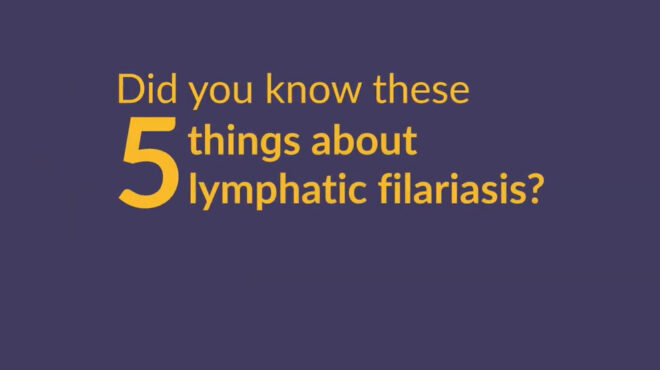Lymphatic filariasis is a serious disease, with millions of people globally at risk. It can cause a range of symptoms, but is often characterised by abnormal enlargement of body parts.
Lymphatic filariasis: causes, symptoms and treatment
Lymphatic filariasis is transmitted via mosquito bite. The infection is usually first acquired during childhood.
It is one of a group of conditions known as neglected tropical diseases (NTDs). Once a person is infected, adult worms lodge in the body’s lymphatic vessels, affecting the lymphatic system. The worms can live for six to eight years, producing millions of larvae that circulate in the infected person’s blood.
The disease can cause abnormally enlarged body parts, which can be extremely painful and can lead to permanent physical changes. This condition, called lymphoedema, is highly stigmatised. In men, it can cause hydrocele, a form of lymphoedema that causes the scrotum to swell, leading to pain and disability.
The debilitating symptoms mean many people are unable to work, and children miss school to care for family members. The associated stigma can have a devastating impact on those affected, as well as their families and communities.
How we’re tackling the disease
Sightsavers is fighting hard to eliminate lymphatic filariasis in the countries in which we work by 2030.
While river blindness is transmitted by the black fly and lymphatic filariasis by the mosquito, both diseases are caused by an infection of a filarial worm and often occur in the same places. Where they are co-endemic, Sightsavers coordinates treatments for these two diseases using Mectizan® tablets, donated by pharmaceutical company Merck Sharpe & Dohme (MSD), and albendazole tablets, donated by GlaxoSmithKline.
In countries where river blindness is not co-endemic, lymphatic filariasis is treated using diethylcarbamazine, produced by Eisai, and albendazole tablets, donated by GlaxoSmithKline.
In 2023, we provided more than 16 million treatments for LF worldwide. We also trained more than 120,000 local volunteers to distribute medication via mass drug administration to treat a range of neglected tropical diseases, including lymphatic filariasis.
Although people with advanced lymphoedema cannot be cured, the symptoms can be eased through surgery and care. Sightsavers works with WASH (water, sanitation and hygiene) organisations to help households access clean water and facilities, so people can clean their limbs and care for their skin. Symptoms can also be helped by elevating limbs and by wearing footwear. Hydrocele can be cured through surgery, transforming the lives of men affected.

“When the swelling got really bad, she couldn’t walk long distances and sometimes struggled to stand.”
Read Salifat’s storyPage last reviewed: November 2024
Next review due: November 2027
Learn how we produce our web content
Find out about other diseases we treat
Neglected tropical diseasesMore about lymphatic filariasis

Sightsavers welcomes FCDO partnership to tackle lymphatic filariasis in Africa
The UK government has committed £15 million towards beating the painful neglected tropical disease.

“We can have life moving forward in a better direction”
As the world celebrates the 12 billionth treatment to protect people from lymphatic filariasis, we reflect on the journey to eliminate the disease in Africa.

“I’m no longer ashamed to walk around the city”
In Burkina Faso, the ARISE II programme is helping to transform the lives of thousands of people who are suffering from lymphatic filariasis.
Inspirational stories direct to your inbox

Inspirational stories direct to your inbox
Want to hear more from Sightsavers? Join more than 170,000 supporters who receive inspiring emails about life-changing projects and ways to support our work.
You will receive regular updates about our work and can unsubscribe at any time by clicking the link in each newsletter, or by emailing info@sightsavers.org
For more information see our privacy policy
